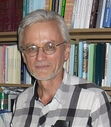Alexander J. Motyl's Blog, page 10
February 13, 2015
Trusting or Containing Putin?
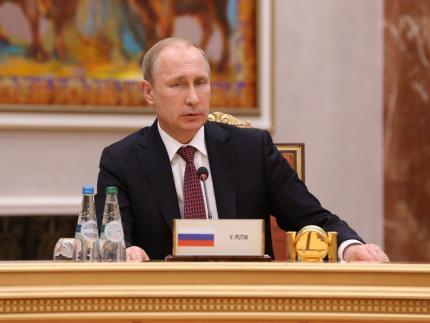
Now that the first step toward a negotiated settlement of the Russo-Ukrainian war may have been reached in Minsk, the question of Russian President Vladimir Putin’s reliability as a negotiating partner should be on everyone’s mind.
In a word, can he be trusted with anything? The answer, unfortunately, is no—for several important reasons.
First, by invading and annexing the Crimea, Putin violated the 1994 Budapest Memorandum on Security Assurances, in which Russia, the United States, and the United Kingdom agreed to respect Ukraine’s territorial integrity in exchange for Ukraine’s adherence to the Treaty on the Non-Proliferation of Nuclear Weapons. Putin’s subsequent justification—that the Maidan Revolution ushered in a new Ukrainian state that was not a signatory of the memorandum—was a preposterous claim that, if generalized, would subvert every treaty ever signed. Subsequently, Putin also violated the April 17th Geneva accords and the September 5th Minsk Protocol, both of which outlined specific steps toward defusing the conflict.
Second, by instigating and arming the separatist rebellion in eastern Ukraine, as well as by deploying thousands of regular Russian troops in the occupied Donbas enclave (whose presence there he continues to deny despite indisputable photographic evidence), Putin has launched a unilateral attack against a neighboring country, thereby violating the spirit and letter of every post–World War II agreement on international norms.
Third, Putin has shown himself to be in thrall to an imperial Russian ideology that clouds his ability to make rational judgments about Russia’s genuine interests. He has repeatedly justified the Crimean annexation in terms of the peninsula’s supposed “sacredness” to Russia and centrality to Russian perceptions of grandeur. In fact, the adventure—along with the subsequent invasion of eastern Donbas—has led to international condemnation and isolation and crippling sanctions that have contributed dramatically to Russia’s current economic free fall. Putin wants Ukraine to remain in Russia’s orbit. Yet, by waging a war of aggression in the Donbas, he has assured and accelerated Kyiv’s westward movement and taken Ukraine-Russia relations to their lowest point in memory. Just a year ago, Ukraine was well on the way to becoming a Russian vassal state with no army, a confused identity, and an unreformed economy. Today, thanks to Putin, Ukraine is an independent state with a functioning army, a reforming economy, and a strong sense of national identity that had eluded the population until the Kremlin and its proxies decided to wage war.
How should Kyiv and the West stop the fighting in eastern Ukraine, if the other side is led by a man who is mendacious, untrustworthy, and consumed by ideology?
The West’s current set of approaches—negotiations and sanctions—must be supplemented with a third, one whose effectiveness does not depend on the trustworthiness of Putin: containment. Negotiations with Putin should be pursued, even though no document that Putin signs will be meaningful—or more meaningful than the 1994 Budapest Memorandum. Sanctions should be maintained and, possibly, even increased, but they will not soon force the hand of a leader whose strategic priorities are driven by an obsession with an ideology that blinds him from his self-interests. If and when sanctions and continued low energy prices bring the Russian economy to a standstill, even Putin may see that he’s driven Russia to the brink of collapse, but that could take years.
That leaves only one option: containment. The Romans built fortifications along sections of their boundary with the barbarians. The Chinese built the Great Wall. The West should try to keep Putin east of Ukraine and Belarus, while Kyiv should keep the Donbas enclave east of Ukraine.
The West should treat Ukraine as the contemporary equivalent of West Germany and help transform it into a stable, secure, democratic, and prosperous state. That means, above all, economic and military assistance. A more ambitious form of containment would regard Belarus—whose authoritarian president has recently changed his country’s course from its formerly pro-Russian direction to a more pro-Ukrainian and pro-Western direction—as another key state in need of Western aid.
Ukraine should pursue containment vis-à-vis the separatist Donbas enclave that, according to the February 12th Minsk agreement, is supposed to enjoy a level of autonomy within Ukraine. Personally, I would have preferred a sanctioned separation of this corrupt and backward region, but since Kyiv agreed to make an effort at reintegration, so be it. But, in that case, Kyiv must now work to restrict the nefarious influence the region will otherwise have on the rest of Ukraine and its efforts to establish a politically and economically reformed and coherent society. Let the separatists have all the autonomy they want. Let them misrule the place to their hearts’ content. In return, let them have as little influence on Ukraine’s movement toward democracy, the market, the West, and the world. Squaring that circle will be hard, but Kyiv may be able to offer maximal autonomy in exchange for maximal non-interference. And if, at some point in the future, Ukraine’s reactionary “Deep South” chooses to separate, Ukraine should oblige.
Will containment resolve the problem of Russia’s illegal annexation of the Crimea or bring a quick end to Putin’s imperialism? No, but it will throw a wrench into Putin’s expansionist designs and thereby weaken his claim to being Russia’s savior. By undermining his legitimacy, containment will accelerate the decay of the Putin regime and its ability to be a bull in Europe’s china shop. In time, the result may even be a Russia that is once again willing to be a fully respected member of the international community.
OG Image: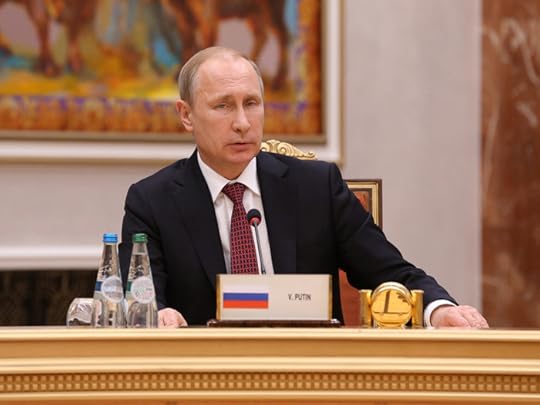 Europe and Central AsiaRussiaVladimir PutinminskDiplomacyCeasefire
Europe and Central AsiaRussiaVladimir PutinminskDiplomacyCeasefire
February 9, 2015
The Case for Arming Ukraine
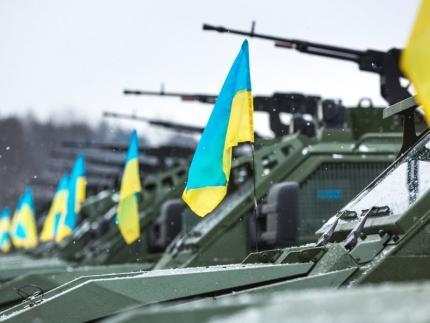
No one could make the case against supplying weapons to Ukraine better than my good friend Rajan Menon, a professor of political science at City College of New York. So, if his best shot falls short, then it’s safe to say that there is no sound argument against America’s provision of military hardware to Ukraine.
That best shot appeared last week as an op-ed in the Los Angeles Times. And it falls far short of what it sets out to be—a persuasive critique of a report released by the Atlantic Council, the Brookings Institution, and the Chicago Council on Global Affairs that argues for US supplies of weapons to Ukraine. Here’s Menon’s first charge:
The group assumes that sending Ukraine arms will send Russian President Vladimir Putin a clear message. … They assume that Putin will recalculate and wind down the war once he sees that the United States is serious about backing Ukraine and that victory will be costlier, bloodier, and more uncertain than he’d anticipated. Well, that’s one possibility. But it’s not the only one. Putin’s main defense for his war has been that the West is actively undermining Russia’s security by drawing into its orbit what from the Russian standpoint is a critical country. Arming Ukraine, therefore, probably would prompt Putin to scale up the war. He would send the secessionists more troops, advisors, and arms.
Ironically, Menon actually agrees that it’s possible for Putin to “recalculate and wind down.” How could Menon disagree? The argument that leaders respond to negative incentives—higher costs, more blood, greater uncertainty—is conventional wisdom among policymakers, diplomats, and academics. Only fanatics impervious to any kind of cost-benefit analysis would push ahead with suicidal behavior, and Menon is not calling Putin a fanatic. Menon mistakenly says: “The presumption that Putin will back off once Kiev gets US weaponry is not based on evidence but hope. And hope is not a strategy.” In fact, this “presumption” is based on a history of effective deterrence in geopolitics accompanied by academic studies. Menon’s protestations to the contrary, the outcome anticipated by the report is perfectly possible, especially given Menon’s implicit assumption of the primacy of geopolitical interests.
So why does Menon lean toward the possibility that Putin would “scale up the war”? Because, in the Kremlin’s view, Ukraine is a “critical country.” Disregard the obvious riposte: that Ukraine is also a “critical country” for the United States and Europe, assuming the West intends to preserve the global postwar security architecture that Putin’s aggression threatens to dismantle. Rather, focus on Menon’s claim that “Putin’s main defense for his war has been that the West is actively undermining Russia’s security.” That’s just not true. The war against Ukraine began with the Kremlin’s occupation of Crimea, from where it spread to the Donbas. From the start, Putin has been unequivocal about his reasons for attacking Ukraine: the need to defend Russians and Russian speakers from the “fascist junta” that replaced President Viktor Yanukovych in Kyiv and the imperative to reclaim sacred and historically Russian territory. Which makes sense, as Putin’s war was a response to Ukraine’s democratic Maidan Revolution, which enshrined people power and posed a direct threat to his rule. Domestic and ideological rationales have always overshadowed invocations of some Western threat in his pronouncements—which also makes sense, as NATO’s supposed interest in “drawing” Ukraine into its “orbit” is nonexistent (and only an ideologically driven Putin could not know that).
Menon says that US weapons supplies would lead “Putin to scale up the war. He would send the secessionists more troops, advisors, and arms.” But Putin has relentlessly committed “more troops, advisors, and arms” since his annexation of Crimea! When the West and Ukraine did nothing in response, he escalated. When the West imposed minor sanctions, he escalated. When the Ukrainians took a beating in September, he escalated. When the Minsk cease-fire occurred, Putin escalated. Whatever the West and Ukraine do, Putin escalates. As Menon rightly says, “There’s not a shred of evidence that Putin has changed course in Ukraine. To the contrary. Moscow’s backing for the separatists has increased, enabling them to regain some of the land lost to Ukraine’s counteroffensive.” Quite. Giving Ukraine arms won’t be the thing that makes Putin escalate whenever he does so again.
Menon’s next argument relates to the supposed absence of a Plan B. As he says, “There’s a basic axiom in war: Don’t take a big step (or even a small one) without having thought hard, and planned for, what you will do if it doesn’t have the intended effect.”
Ignore the fact that Menon has no Plan B, and that, logically, his response to all further Russian aggression would have to be: do nothing, lest the Russians escalate. Here’s the more important problem with this thinking: Military assistance to Ukraine is more like a Plan D. Plan A was for the West and Ukraine to protest. Putin escalated in response. Plan B was sanctions. They’re destroying the Russian economy, but, once again, Putin escalated. Plan C was the Minsk cease-fire—and Putin escalated. Military assistance is not an alternative to current policy; it’s a logical outgrowth of the failure of Western policy to stop the Russian aggression. And it’s an approach that is rooted in the conventional wisdom of the foreign policy establishment in both the West and Russia. The only thing that could stop Putin is some combination of soft and hard power—of diplomacy, economic pressure, and military threats. The West’s mistake has been to embark on these actions serially, and not simultaneously. By arming Ukraine, the United States and its allies would finally be in the position to engage in effective diplomacy and bring about a peaceful solution to the war.
Menon’s final argument is this: “But here’s the plan’s biggest flaw. Imagine that a Ukrainian army beefed up with American weaponry suffers serial defeats. … What then? … We would have to retreat or wade in deeper.”
This argument is far too simple. Why should the Ukrainians necessarily suffer serial defeats if, as every Ukrainian policymaker who knows Ukraine can’t beat Russia will tell you, the point of getting US weapons is to deter the Russians and prevent them from making further territorial gains? Even if the Russians escalate in response—and they escalate regardless of what the West does—why does Menon assume that they’d be willing to throw all caution to the wind and escalate so severely? Why does Menon assume that supplies of arms have to be so huge as to transform Ukraine into a strategic threat that Russia feels impelled to nip in the bud? Why does he assume that US policymakers are irrationally incapable of recognizing their own country’s interests and simultaneously saying yes to Ukrainian self-defense and no to war with Russia?
Assumptions, like hope, are not a strategy.
OG Image: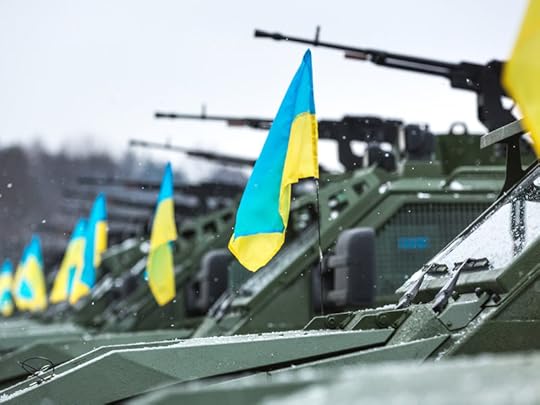 Europe and Central AsiaUkraineVladimir PutinUkraine ConflictMilitaryMilitary AidArmsNATOUnited States
Europe and Central AsiaUkraineVladimir PutinUkraine ConflictMilitaryMilitary AidArmsNATOUnited States
January 30, 2015
Putin's War on Civilians Defines Terrorism
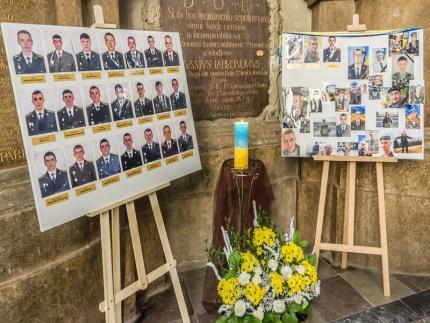
Russian President Vladimir Putin is rapidly cementing his reputation as a sponsor of terrorism in Ukraine. One could, with some stretch of the imagination, have qualified the earlier violence perpetrated by his proxies in eastern Ukraine as mere “separatism.” In a blog post on April 14, 2014, however, I suggested that it qualified as terrorism, and that Putin’s Russia was therefore a state sponsor of terrorism. I then provided the definition of terrorism found in Section 2656f(d) of Title 22 of the United States Code:
(1) the term “international terrorism” means terrorism involving citizens or the territory of more than one country;
(2) the term “terrorism” means premeditated, politically motivated violence perpetrated against non-combatant targets by subnational groups or clandestine agents; and
(3) the term “terrorist group” means any group practicing, or which has significant subgroups which practice, international terrorism.
The recent bombings of purely civilian targets in Kharkiv, Odessa, Donetsk, and Zaporizhzhya provinces are terrorism, pure and simple. When bombs are intended to kill regular folk and then do so, the civilized world denounces such barbaric behavior as terrorism and rightly condemns its perpetrators as criminals. Or, at least, it should—even if the perpetrator runs a huge state with nuclear weapons and bank accounts in the West. If it fails to do so, it loses the right to condemn terrorism and terrorists anywhere.
The perpetrators of Putin’s terrorism are welcome to call themselves “partisans,” and their leader, “Rudolf,” insists they are acting on their own initiative. That’s about as believable as Russian Foreign Minister Sergei Lavrov’s repeated statements that there are no regular Russian forces in the Donbas. Just as the Donbas proxies are creatures of the Russian security services and armed forces, so too the only possible rational working assumption has to be that the terrorists in southeastern Ukraine are the creatures of Putin. Given his ruthless mendacity and duplicity, it would be absurd and naïve to assume otherwise.
“Rudolf” claims that the terrorists number 10,000 in Odessa Province, 12,000 to 15,000 in Kharkiv Province, and 5,000 in Zaporizhzhya Province. The numbers are obviously greatly inflated. There could be that many sympathizers, in which case the actual number of active terrorists is probably in the hundreds. That makes them a tiny minority within populations that overwhelmingly reject everything the terrorists and Putin stand for. But terrorists always are small minorities who know that they don’t stand a chance in an open political competition and therefore need to terrorize.
The emergence of a Russian-sponsored machine expressly intended to kill Ukrainian civilians has several important implications—for Ukraine, the terrorists and their Kremlin sponsors, and the world.
Ukraine will have to get used to the fact that it has become the Israel of Eastern Europe. Terrorism will remain a threat to the security of its people as long as Putin rules the Kremlin. To live that way is terrible, but Ukrainians may console themselves with the fact that Israel has thrived despite terrorism.
The terrorists and Putin will fail to achieve their goals—whatever they happen to be. Terrorists may cause mayhem, but in the long term they rarely destabilize the states they attack. Rather, their pursuit of terror reliably creates a strong counter-terrorist security service and police force in the targeted countries. Ukraine’s security forces, which have already begun to crack down on the terrorists, will get better at their job as time passes. Just as Putin’s aggression in eastern Ukraine has led Ukraine to acquire a real army, so too his proxies’ bomb-throwing is leading Ukraine to acquire a real security apparatus.
Finally, it is time for the world and the West in particular to recognize that Putin is not just a warmonger and imperialist, but also a terrorist—no different than Muammar Qaddafi, Saddam Hussein, Bashar al-Assad, or Osama bin Laden. They all kill civilians with abandon; they all engage in “premeditated, politically motivated violence perpetrated against non-combatant targets.” Russia should be declared a state supporter of terrorism, and Putin should be shunned by every democratic leader who believes in the intrinsic value of human life. Anything else is to tolerate and encourage the barbarian in the Kremlin.
OG Image: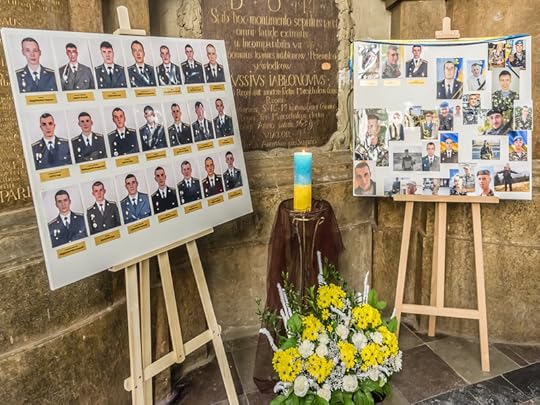 Europe and Central AsiaRussiaVladimir PutinCiviliansViolenceTerrorism
Europe and Central AsiaRussiaVladimir PutinCiviliansViolenceTerrorism
January 23, 2015
Free Nadia Savchenko!
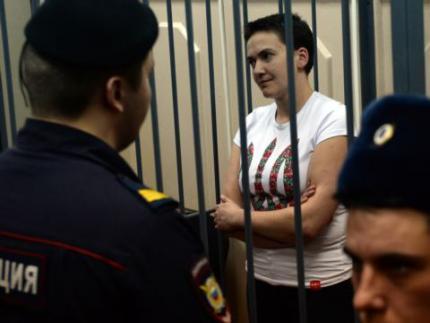
Vladimir Putin’s star political prisoner—Nadia Savchenko—is a 34-year-old Ukrainian helicopter pilot who served with a volunteer battalion in eastern Ukraine this summer and was taken prisoner by Putin’s proxies. She was subsequently charged with abetting the deaths of two Russian journalists who died in an artillery exchange between Ukrainian and Russian forces. Currently imprisoned in Moscow, Savchenko has been on a hunger strike since December 13, 2014. Needless to say, her life is in danger.
On January 9th, State Department spokeswoman Jen Psaki called for Savchenko’s “immediate release”: “We’re deeply concerned by reports that Russia has moved Ukrainian pilot Nadia Savchenko to solitary confinement.”
At a December 18th news conference, Putin made the following comments about Savchenko
According to our law enforcement agencies, Ms. Savchenko called in artillery fire via radio. If it is reliably established during the pretrial investigation and the subsequent trial that she was not involved and is not guilty, she will be released immediately. But if they prove that she was indeed involved in the journalists’ murder, a Russian court will issue a proper ruling, as I see it, and she will serve her sentence in accordance with the verdict.
According to the Open Dialog Foundation, an independent human rights watchdog who provided legal aid to Savchenko’s lawyers, “there is no evidence of her guilt in the alleged crime; however, the Russian court continues to render decisions, favorable to the prosecution.” The foundation alleges that the charges rest on the account of a wounded Ukrainian soldier who “testified as a result of torture and a direct threat to his life.” According to the foundation, Savchenko’s lawyers “were also able to obtain information regarding mobile phone connections and phone calls” that prove “Savchenko could not have committed the crime of which she is accused, as at that time she was in a completely different location than the one indicated in the criminal case.”
Given Putin’s hostility to rule of law, democracy, and human rights, it’s no surprise that the charges brought against Savchenko are totally unjustified. Savchenko’s arrest is as much of a setup and travesty as the arrests of Mikhail Khodorkovsky and Vladimir Yevtushenkov by Putin, or of Yuri Lutsenko and Yulia Tymoshenko by deposed Ukrainian President Viktor Yanukovych.
So, why Savchenko? Why pick on her when Putin could have just as easily pinned bogus charges on any one of the more than 1,000 Ukrainian prisoners of war who’ve been detained by his terrorist proxies in the Donbas enclave?
It’s hard not to conclude that Savchenko’s being a woman has something—everything?—to do with her arrest and detention. Male Ukrainian prisoners are, as far as Putin’s macho understanding of the world is concerned, the right kind of prisoners: men. After all, war and fighting are occupations for men. Some men, like the macho Putin, do these tasks well and survive. Some perform badly and die. C’est la vie. One thing is clear, however: women—and especially Ukrainian women—have no place whatsoever on the battlefield. Deconstruct Russian and Soviet cultural stereotypes of Ukrainians and you’ll find that the Little Russians are usually endowed with “feminine” characteristics. Which is to say that Ukrainians are “weak,” while Russians, the elder brother, are “strong”—and invariably portrayed as males.
Savchenko’s capture must have appeared like a golden opportunity to Russia’s sexist-in-chief. Arresting and throwing her in jail was like killing four birds with one stone. Big Vlad got to huff and puff like a he-man. Russia’s sexist political culture was reinforced. Women were put in their place. And Ukrainians were reminded that they’re no match for the nation that spawned Putin.
Naturally, this embarrassing display of machismo is just a cover for some deep-seated insecurity about women. In that sense, Putin is no different from his kid brother, Yanukovych, whose need to establish his masculinity ultimately led to his complete political impotence.
Obviously, Savchenko should be freed. Just as obviously, she won’t—at least not until Putin’s fears of strong Ukrainian women are calmed.
Photo Credit: AFP
OG Image: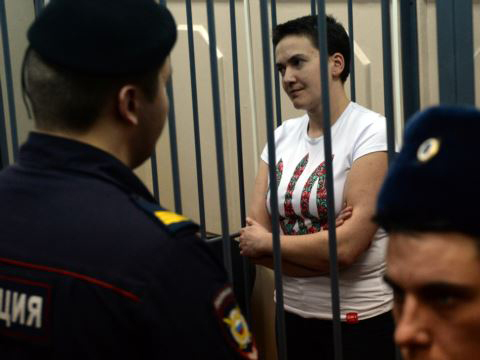 Europe and Central AsiaRussiaUkraineUSVladimir PutinJen Psaki
Europe and Central AsiaRussiaUkraineUSVladimir PutinJen Psaki
January 16, 2015
What to Expect from Russia, Ukraine in 2015?
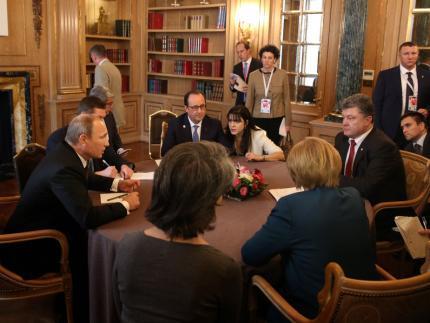
What should we expect from Ukraine and Russia in 2015?
My guess is: more of the same. And that’s both the good news and the bad news.
Ukraine will consolidate its democratic institutions, while Vladimir Putin’s Russia will consolidate its fascist regime. Although Ukrainians will complain more than Russians, their country will actually be getting stronger, while the hypercentralized state structure centered on Putin’s cult of the macho personality gets weaker. Democratically ruled peoples whine publicly; dictatorially ruled peoples whine privately. The fact that 80-plus percent of Russians are likely to continue to support Putin won’t mean that 80-plus percent are happy with life in Putin’s crumbling realm.
Economically, both countries will be in for trying times. Ukraine’s GDP will contract, unemployment will rise, and inflation will increase—but for the right reasons, as Kyiv embarks on reforms that, while not quite as radical as most economists would wish, will be radical enough to begin the long and arduous task of transforming Ukraine into a genuine market economy. Russia’s GDP will also contract, unemployment will also rise, and inflation will also increase—but for the wrong reasons, as the ossified Putin regime pays heavily for having not diversified or developed its doomed economy. Energy prices, the ruble, its gold reserves, and foreign and domestic investment will collapse as Russian capital takes flight and pressure from Western sanctions continues. The economies of both the Russian-occupied Donbas enclave and the Crimea will contract even more, making life increasingly unbearable for their inhabitants, who will continue to flee both eastward and westward, thereby pushing both regions closer to literal no-man’s-lands.
Socially, both countries will see a rise in popular activism. Ukrainians will take to the streets to protest against radical reforms that inevitably lower their already low living standards. Russians, even those who continue to dote on Putin, will take to the streets to protest against empty store shelves, government corruption, and the steady flow of body bags from the occupied Donbas. As Putin’s repressive apparatus responds with more arrests and head-crackings, expect a determined minority—perhaps Russians, almost certainly non-Russians—to respond with acts of terrorism.
The war in eastern Ukraine will go on, despite the best efforts of the West and Kyiv to reach a negotiated settlement. For one thing, Putin’s proxies in eastern Ukraine are out-of-control warlords for whom war has become their only raison d’être. For another, Putin will want no permanent peace, as that would only stabilize Ukraine. A large-scale military assault aimed at capturing all of Ukraine, or even establishing a corridor from Russia to the Crimea, is probably out of the question, as the Ukrainian armed forces are strong enough to deter it. But low-level fighting of the kind that has characterized the Donbas for the last few months seems a sure bet. Equally likely is a continuation of terrorist attacks within Ukraine, which Ukraine will survive while Putin’s reputation as an exporter of terrorism will only grow.
Ukraine will continue to insist that the Russian-occupied territories are occupied only “temporarily,” and Russia will continue to insist that its war against Ukraine is really only an internal Ukrainian squabble, but the end result of Russia’s continued occupation of both the Donbas enclave and the Crimea will be the continued, if uneven, consolidation of Russian rule. Faced with tough economic circumstances at home, Kyiv will continue to reduce its economic relations with, and financial subsidy of, the occupied territories. The burden of supporting the increasingly desperate inhabitants will fall on Russia, which will have to decide whether it prefers to make hay from a humanitarian catastrophe of its own making or actually to help save the victims of its imperialist policies. My guess is that Putin the great humanitarian will opt for catastrophe.
All in all, barring some unexpected deus ex machina, Ukraine’s state, society, and army should get stronger, while its economy should be on the mend. Russia’s state and economy will weaken, its army will discover the limits of its strength, and its society will grow more troublesome for Putin. Ukraine and Russia will be moving in diametrically opposed directions. Time is on Ukraine’s side, and decidedly not on Russia’s, because time favors democracy and not fascism.
Under conditions such as these, the Putin regime could actually disintegrate. Russia’s foreign minister, Sergei Lavrov, has recently accused Western leaders of wanting “regime change” in Russia. They don’t. But they should. Replacing Putin’s fascism with democracy as soon as possible would be the greatest thing for Russia, Ukraine, and the world.
OG Image: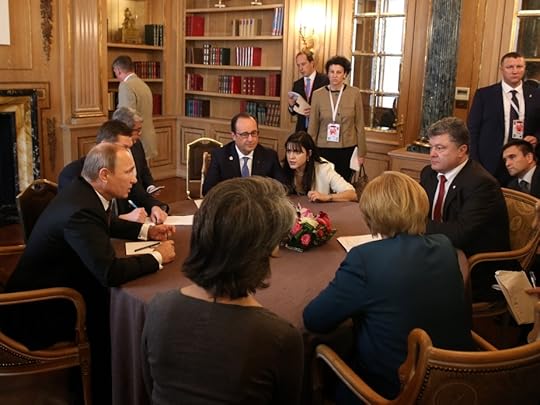 Europe and Central AsiaRussiaUkraineVladimir Putin
Europe and Central AsiaRussiaUkraineVladimir Putin
January 12, 2015
'The Russian Army Has Huge Problems'
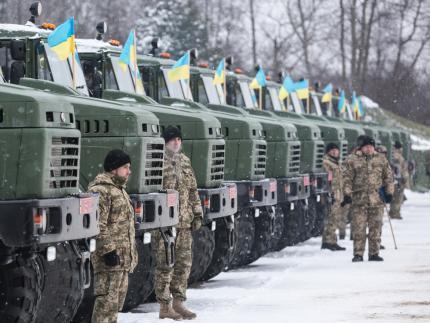
The following is an interview with Rajan Menon, a professor of political science at the City College of New York and a senior research scholar at the Arnold A. Saltzman Institute of War and Peace Studies at Columbia University.
* * *
MOTYL: You and Eugene Rumer of the Carnegie Endowment have just completed a book about Ukraine. What is its central argument?
MENON: The Russia-West relationship has collapsed. Russia stands isolated and damaged. But an isolated, nationalistic, and authoritarian Russia isn’t what Europe needs—and it’s certainly not good for Ukraine. Ukraine cannot afford to be in a perpetual state of war with Russia, if only because no Western soldier will ever be dispatched to die for Ukraine.
MOTYL: Do you expect Kyiv to launch radical reforms?
MENON: Crises can certainly concentrate minds and inspire tough choices, but the vested interests opposed to reform are baked into Ukraine’s system of patronage, corruption, and crony capitalism, which long preceded [deposed Ukrainian President Viktor] Yanukovych. [President Petro] Poroshenko and [Prime Minister Arseniy] Yatsenyuk are smart and understand what’s at stake. But voters everywhere become less enthusiastic about reform once it’s clear they will bring immediate pain and only long-term gains. It’s insufficient for reforms to be economically “correct”; they must be politically sustainable and introduced in the proper sequence, with provisions for softening their most malign effects.
MOTYL: What are the Ukrainian government’s most important policy priorities?
MENON: First, not repeating their Orange predecessors’ ruinous error of political feuding (there are already some signs of this, alas). That will alienate voters and give Russia more opportunities for meddling. Second, not dwelling on recapturing the so-called Donbas republics, to say nothing of Crimea. The loss of these lands, which have been anti-reform bastions, is a blessing in disguise for Ukraine. You yourself have said this in your articles. Ukraine is now ethnically more homogeneous: that is a huge plus given its particular circumstances. Third, sequencing reforms properly and ensuring that society’s most vulnerable segments are provided cushions. Fourth, targeting areas in which tangible success can be attained quickly so as to build political capital for the Kyiv government.
MOTYL: Every one-two months, Ukraine expects a massive Russian invasion. Is this a valid fear?
MENON: The Russian army has huge problems. People tend to tally Russian divisions, not realizing that a significant number aren’t fully staffed, equipped, or combat-ready. Moreover, the poor quality of recruits mirrors Russia’s health crisis. Russia already has thousands of troops deployed—unsuccessfully—to quell a 20-year insurgency that’s spread across the entire North Caucasus.
Ukraine is large and populous; Russian generals will be hard-pressed to sustain an army in the field, especially once their units enter regions with hefty Ukrainian majorities. Ukrainians have a history of partisan warfare and will resist. Urban warfare is a bloody business, and Russia would pay a heavy price to conquer and hold big Ukrainians cities. Russian airpower and artillery can cause huge damage, but only ground forces can seize and retain territory: that’s where Russia’s military weaknesses will become apparent. In Crimea, Russia had unique advantages (troops and military infrastructure in place plus a welcoming Russian majority) that it won’t have elsewhere in Ukraine. Politically, a full-blown Russian invasion would eviscerate Moscow’s relationship with the West, rendering Russia a raw-material appendage of China.
MOTYL: What’s the likelihood of a Russian attempt to establish a land corridor to the Crimea?
MENON: It’s not impossible, especially if the West piles on economic pressure, leaving [President Vladimir] Putin to believe Russia has little to lose and something to gain by seeking land connection to Crimea. Still, a Russian corridor from, say, Novoazovsk to Crimea, while non-trivial and undesirable for Ukraine, is not in my view a strategic catastrophe for the country.
MOTYL: How can Ukraine defend itself militarily?
MENON: First, pull back from the “republics,” declare a no-forces-zone, call upon Russia to respect it, and invite third-party peacekeepers to patrol it. Second, build a small professional (non-conscript) force whose strengths are in mobility (ground and airborne forces), anti-armor weapons and short-range ground-to-ground missiles, air defense radars and missiles, and electronic countermeasures. (Deterrence doesn’t require equivalence.) Third, slowly develop a war-fighting capability that’s designed not to seize territory or defeat Russia (impossible for Ukraine), but to deny it an easy victory and to make the cost of prevailing prohibitive. Finally, besides cultivating ties with the West, increase trade and investment with China so that it gains a strategic stake in Ukraine. Steps two, three, and four will take time to accomplish.
MOTYL: What should Ukraine and the West do to end the war?
MENON: Ukraine cannot end Russia’s military intervention on the side of the Donbas separatists. Still, Ukraine should renounce NATO membership. The alliance won’t admit Ukraine anyway, so Kyiv loses nothing by relinquishing something it won’t get. The West should stop pretending NATO expansion doesn’t bother Russia. It always has. Russia was simply too weak in the 1990s to push back. A no-NATO pledge combined with a no-forces-zone patrolled by peacekeepers and observers can bolster Ukraine’s security and allay Russia’s main strategic concern. That same “no” pledge shouldn’t apply to the EU Association Agreement.
MOTYL: What does Putin want from Ukraine?
MENON: Putin could have declared victory after taking Crimea. I’m flummoxed by his recent moves: they benefit neither him nor Russia. More broadly, Russia has been reduced to a regional power. It aspires to be dominant in what’s left of the former Soviet space. Because of the cultural and historical ties between Ukraine and Russia, many Russians can’t accept that Ukraine is a separate state seeking its own destiny.
MOTYL: Where do you expect Ukraine and Russia to be one year from now?
MENON: Ukraine will be muddling through a tough reform process—and finding that the West is better at promising than delivering tangible support. Russia will be seeking a rapprochement with the West. Russia doesn’t want to be a Chinese client: the power ratio favors Beijing so heavily that Russia will be a satrap in any alliance with China. Some European states will seek to reciprocate, making divisions within the EU and NATO on the appropriate Russia policy much more evident. In short, while the situation will improve, the pace will be slow, the trajectory non-linear.
OG Image: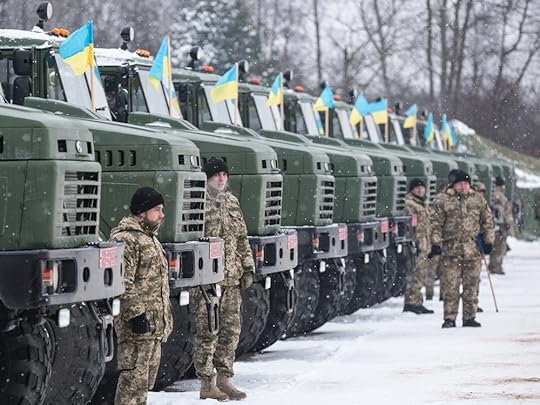 Europe and Central AsiaRussiaColombiaUkraineEurope
Europe and Central AsiaRussiaColombiaUkraineEurope
January 5, 2015
Sex, Politics, and Putin
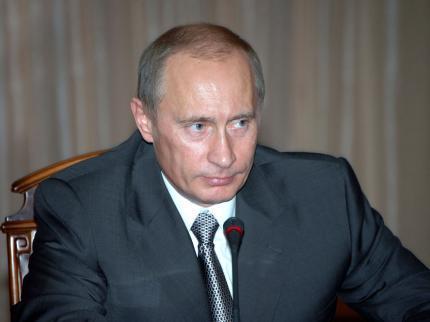
If you’d like to know one of the reasons for Vladimir Putin’s phenomenal popularity in Russia, pick up Clark University Professor Valerie Sperling’s excellent new book, Sex, Politics, and Putin: Political Legitimacy in Russia.
Putin’s actual accomplishments are few. He dismantled democracy and muzzled the media. He constructed a fascistoid regime and perverted the very notion of truth. He marginalized the democratic opposition and, at least until recently, crushed the North Caucasus independence movements. He annexed the Crimea and doesn’t know what to do with it. He started a war in eastern Ukraine and, once again, doesn’t know what to do next. The bottom line is that Russia remains a Belgium with a bomb and a profoundly corrupt petro-state incapable of technological innovation and sustained economic growth, while having become, under Putin, a rogue state.
These are the accomplishments of a profoundly mediocre leader, one whose popularity ratings should be around 20 percent at most—and not the breathtaking 85-plus that he routinely garners. As Sperling explains in her well-written and well-researched book, an important reason for Putin’s popularity is his careful manipulation of gender and sex as a means of sustaining his political legitimacy: “his variant of masculinity (including strength, sobriety, decisiveness, and attractiveness to women) was met with popular approval, reinforcing his position of power and authority.”
There are several complex reasons, or what Sperling calls “multiple opportunity structures,” for the success of Putin’s strategy, and I shall list only their sound-bite versions:
The “weakness of the Russian women’s movement” meant that there were few people “to draw critical attention to public sexism.”
“As commercial capitalism was introduced to Russia in the 1990s,” it “commodified and objectified women’s bodies.” In turn, “the sexualization of economic products lay the groundwork for the sexualization of political products.”
“The ‘Russia needs a strong leader’ myth has never been dissolved.”
Russian culture is characterized by “sex-based discrimination and misogyny.”
“Putin’s macho image accompanied a broader strategy to ‘remasculinize’ the country domestically and internationally,” in the aftermath of the USSR’s humiliating collapse.
In sum, Putin has imposed his retrograde views on Russians, but Russians have also been highly receptive to his message.
Sperling’s analysis has important implications for the stability of the regime.
First, the older Putin gets—and he is already 62 years old—the more difficult will it be for him to project a macho image. Look at today’s Putin and compare him to the Putin of 2000. Then, he resembled a sleek killing machine. Today, his face is puffy, his features are distended, and he looks like he’s been a one long binge. Several years ago, it was plausible for two sexy Russian ladies to sing, “I want a man just like Putin.” Today, that sentiment would sound bizarre coming from anyone but the septuagenarian crowd.
The inability to project machismo matters precisely because, as Sperling underlines, it is central to Putin’s political legitimacy. Worse for Putin, machismo has become so large a part of his supremacist ideology and anti-Western bluster that it would be hard for him to abandon hyper-masculinity and focus only on ideology and chest-beating. Inasmuch as Putin is central to the Putin regime, the inevitable decline in his legitimacy automatically translates into the decline of the regime.
Second, Sperling’s analysis suggests that the 20-plus point increase in Putin’s popularity in the aftermath of the Crimea’s annexation—from the low 60s to the high 80s—may be due less to the Russian public’s endorsement of imperialist landgrabs and more to its enthusiasm for the tough-guy posturing the landgrab permitted Putin to engage in. The war in eastern Ukraine can’t have the same effect, partly because Putin denies that Russian troops are involved and mostly because the fighting has produced significant numbers of Russian casualties (possibly as many as several thousand). Victorious Russian troops in the streets of Sevastopol enhance Putin’s macho image. Body bags from the Donbas do not. If so, a wider war with Ukraine will not enhance Putin’s machismo. Incessant saber-rattling throughout the world will.
Third, Russia will remain a retrograde society when it comes to gender relations for many years to come. If the problem were just Putin, Russia could become a nice place as soon as Putin departs the scene. But since, as Sperling implies, the problem is also Russia, then Putin’s departure won’t change things. Expect disillusioned Russian liberals to head for the West and for comparatively more tolerant places such as Ukraine. Inasmuch as this cohort is likely to be best educated, their departure will also condemn Russia to decades of economic backwardness.
Poor Russia: thanks to its leader’s 19th-century machismo, it may soon be catapulted back to the 1850s.
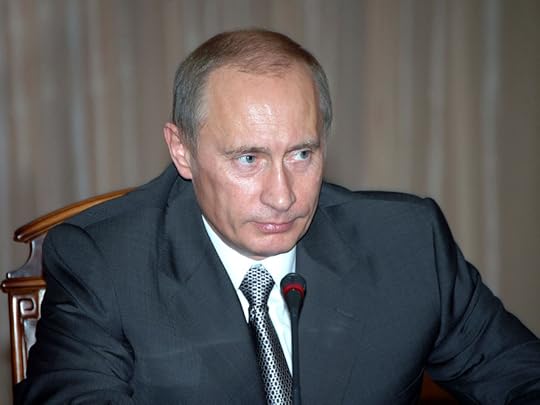 Europe and Central AsiaRussiaVladimir Putin
Europe and Central AsiaRussiaVladimir Putin
December 23, 2014
The Putin-Santa Letters, 2014
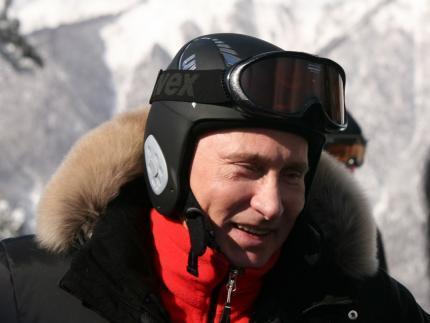
The Communist Party of St. Petersburg recently issued a statement to Russian children in which it warned them against the imperialist intentions of the CIA stooge, Santa Claus. (Seriously.)
Fortunately, Russia’s ever vigilant president, Vladimir Putin, is already on the case, as the below correspondence (intercepted by Santa Claus’s imperialist intelligence service) reveals.
Dear Vlad,
Would you happen to know the whereabouts of Viktor Yanukovych? I haven’t heard from him in over a year.
Respectfully,
Santa
Mr. “Santa Claus”:
Are you a head of state? No, you are not. Is the North Pole a state? No, it is not. You will henceforth address me as The Honorable Vladimir Putin, President of the Russian Federation, and demonstrate the requisite respect for the greatness of my country.
There are several issues to which I would like to draw your attention:
First, I have been informed that your sleighs and reindeer have repeatedly violated Russian airspace. If you do not cease these unwarranted violations of our sovereignty, I shall have no choice but to adopt the appropriate defensive measures. Remember that Russian troops could be in the North Pole in two days. Moreover, please be forewarned that we fully understand that the incessant jingling that accompanies your alleged “sleigh rides” is intended to scramble our air defense systems. I suggest you cease forthwith.
Second, it has come to our attention that the language and culture of Russian-speaking elves are being violated systematically. Your dictatorial regime (we are fully aware that you were never elected but seized power in a coup) forbids Russian-language schools, Russian-language media, and Russian-language arts. If you do not cease your crass violations of the inalienable rights of your persecuted Russian minority, I shall have no choice but to apply the appropriate defensive measures. By the same token, your insistence that English be mandatory throughout the territory you rule is a violation of the European Charter on Minority Languages and must be revoked.
Third, I would like to inform you that the North Pole is sacred Russian territory. It is a well-known fact that Holy Russia brought Christianity to the North Pole many centuries before you seized power, mobilized fascist and neo-Nazi elves, and inflicted social genocide upon the aboriginal Russian inhabitants. The Russian Federation will defend its interests—and it will especially defend its sacred interests—regardless of the imperialist ambitions of you and your neo-Nazi allies.
Fourth, it has come to my attention that you intend to join NATO. Russia cannot permit the extension of a hostile alliance that snubs Russian interests and pride in a region of strategic and sacred importance to all Russians. Please be advised that the emplacement of NATO troops, ships, and long-range rockets on the North Pole will not be tolerated. If Russian-speaking elves fearful of American imperialism appeal to Mother Russia for help, we shall be compelled to respond with all necessary measures, including sending little green elves as emissaries of peace.
Fifth, it has come to my attention that you intend to sign an Association Agreement with the European Union. Please be aware that such an action will be deemed hostile by Russia, which will be forced to respond accordingly. Needless to say, your ability to distribute your one and only export—what you preposterously claim are mere “gifts”—depends overwhelmingly on a duty-free regime with Russia and lax customs controls. I strongly urge you to consider joining the Eurasian Union, which will open up new markets to you in democratic Russia, Belarus, Kazakhstan, and Armenia.
Sixth, the solution to all your crass violations of democracy, human rights, and international legal norms is obvious. Convene your ruling bodies and formally request that the Russian Federation accept the North Pole as an autonomous republic with the same status as Holy Crimea. I am certain that the Federation Council will accede to your request.
Mr. Claus, permit me to speak frankly and sincerely: that move would open up great vistas for you and your land. There is a strong possibility of your being appointed prime minister of the Russian Federation. In turn, Dmitri Medvedev could assume your current position. Few would notice the difference. Your elves would have access to the wonders of Russian civilization—everything from Valery Gergiev to Russia Today TV. Due to their size, they would of course be exempted from military service. On the other hand, I see great opportunities for them in the secret service, where size does not matter. Naturally, you will be well advised to change your name: Sergei Clausov would be my recommendation.
Mr. Clausov (if I may), the Russian Federation and the North Pole can be friends, or they can be enemies. The choice is yours.
Respectfully,
Vladimir Putin,
President of the Russian Federation
P.S. Viktor Yanukovych insists you are a fascist coup-plotter and asks that you cease hunting him.
Dear Mr. President,
Thank you for your kind offer, but my elves have voted unanimously to move the North Pole to Ukraine, on the grounds that the North Pole is an imagined community that can be located anywhere. President Poroshenko informs me that we shall be able to use Mr. Yanukovych’s former estate in Mezhyhirya gratis. Frankly, I’m tired of the ice, and Ukraine, I’m told, is on the verge of a major thaw. (I’m also told that Russia is on the verge of a major meltdown, so congratulations to you are presumably in order.) The elves are looking forward to pepper vodka and pierogis. Rudolph says he can’t wait to bathe in the Dnipro River.
Naturally, you and your countrymen are welcome to the ice cap. Poroshenko said that may be your last refuge, but I’m not at all sure what he meant.
Best,
Serhii Clausenko
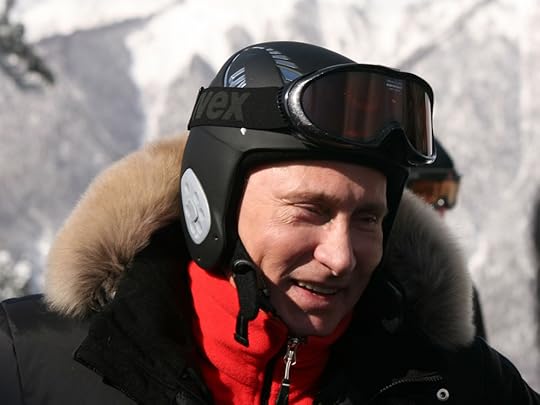 Europe and Central AsiaRussiaUSUkraineVladimir PutinViktor Yanukovych
Europe and Central AsiaRussiaUSUkraineVladimir PutinViktor Yanukovych
December 22, 2014
Ukraine's Pro-Reform Cabinet
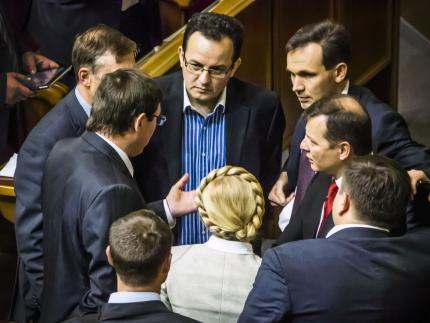
Ukraine may finally have a cabinet able to introduce radical reforms. For the first time in independent Ukraine’s history, its ministers are young and Western. Youth matters, as it’s a measure of the degree to which individuals are still captives of the Soviet past. Western attitudes and experience also matter, as they presumably reflect the willingness and ability of the ministers to embark on pro-Western reforms.
The composition of the new cabinet was announced on December 2nd. Most commentators focused on the fact that three of the ministers were foreigners—an American, a Lithuanian, and a Georgian. That was certainly indicative of Kyiv’s willingness to think “out of the box,” especially as two of the three received the crucial economic development and finance portfolios.
But the objective characteristics of the 20 cabinet members are no less important. Their mean age is 43.7; their median age is 44.5. (I was unable to find the date of birth of one minister: judging from his appearance, I calculated it at 45.) Here’s the age breakdown: 59, 50, 49, 49, 49, 47, 47, 47, 46, 45, 44, 44, 43, 40, 38, 38, 38, 36, 35, 30. The majority have spent more time living in post-Soviet than in Soviet conditions. The 59-year-old was 36 when the USSR collapsed, and the 30-year-old was only 7, but all the others were somewhere between 12 and 26 in 1991. And if you consider that Mikhail Gorbachev’s perestroika marked the end of Soviet totalitarianism, then the caesura gets moved back to 1986—which means that most of the ministers were between 7 and 21 when the Soviet world began to end.
No less important, the ministers are remarkably Western. Exactly one-half have studied abroad for some period of time; one-half have also had some form of extended experience with the West, whether in business, politics, or diplomacy. If you count all the individuals with either Western educations or Western experience (Western education and experience don’t always go together), then the number of ministers with some acquaintance with the West rises to 12—or 60 percent. In other words, these people know the West. They understand Western institutions and Western rules of the game. According to economist Anders Aslund, “All but two of the 20 ministers speak English, while only two ministers spoke English in President Viktor Yanukovych’s last government.”
Do these characteristics automatically mean that the ministers will promote pro-Western reforms? Of course not. On the other hand, these are just the features we would expect to see in a pro-Western, pro-reform cabinet. Naturally, one can criticize each individual minister for this or that—and the Ukrainian press has gleefully, and rightly, done just that. (Thus far, no exceptionally embarrassing skeletons have been found.) In the aggregate, however, this is an excellent group that has the knowledge and experience to introduce radical change. No less important, this is a group that probably understands that Ukraine’s economy could collapse in the absence of reforms and that the West will help Ukraine only if it embarks on reform.
So the news from Ukraine, at least with respect to the government, is quite good—finally. Given the positive nature of this development, it’s all the more bizarre for liberal, level-headed Western commentators to repeat the Kremlin’s line on the continuing threat of fascism in Ukraine. Here’s the celebrated author Anatol Lieven, currently a professor at Georgetown University’s School of Foreign Service in Qatar:
Kiev’s dependence on … oligarchs and on nationalist militias to fight the war in eastern Ukraine represents a serious and growing threat to Ukrainian democracy and to the spread of liberal values in Ukraine.
A worrying sign in this regard was the appointment last month of Vadim Troyan as regional chief of police in Kiev. His regiment, the Azov battalion, is known for links to the far right and his promotion seems largely in reward for his group’s participation in the fighting in eastern Ukraine.
But wait: doesn’t Kyiv’s appointment of a democratic cabinet represent a serious and growing promotion of Ukrainian democracy and of the spread of liberal values? Isn’t it at least worth mentioning, if only to provide some balance? Doesn’t the appointment of 20 pro-reform ministers trump the appointment of one right-wing cop?
And just why was Troyan appointed? Lieven obviously doesn’t know (hence his use of two conditionals “seems largely”), but if he had done some research, he might have learned that Interior Minister Arsen Avakov “seems largely” to have wanted a tough individual with the guts to implement his planned radical reform of the militia in a key province.
Personally, I don’t care for the Azov Battalion’s ideological leanings, and I share Lieven’s knee-jerk distaste for anyone sharing them. On the other hand, Troyan completed the Kharkiv University of Internal Affairs, proved himself in difficult fighting in eastern Ukraine, and was associated with Avakov’s former business partner, Oleksandr Lypchansky. None of this excuses Troyan’s politics—whatever they are—but it does suggest that Avakov wasn’t rewarding Azov when he promoted Troyan. Instead, he was promoting his own reform agenda and drawing on someone with the requisite experience and the old-boy connections. Avakov was acting like a Western politician, but that banality does not, alas, fit the sexier narrative of fascists lurking behind every tree.
OG Image: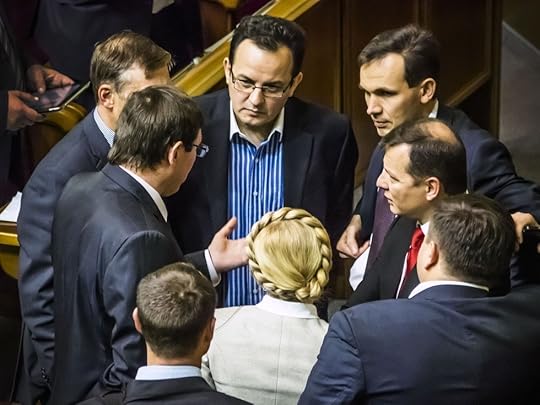 Europe and Central AsiaUkrainePetro PoroshenkoDemocracy
Europe and Central AsiaUkrainePetro PoroshenkoDemocracy
December 9, 2014
Decoding Putin’s State of the Union Speech
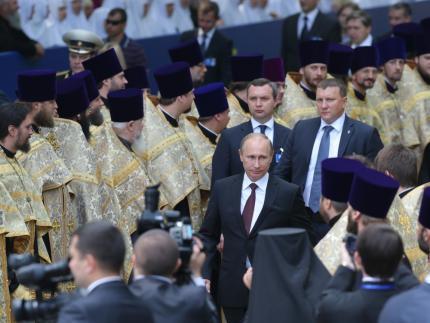
Vladimir Putin’s December 4th “state of the union” address to Russia’s Federal Assembly once again explained why he annexed the Crimea. This time, his explanation reached new ideological heights, while again confounding academic realists, who continue to insist that Russia grabbed the Crimea in response to an aggressive West. Here are Putin’s words:
[The annexation of the Crimea] has special significance for our country and our people. Because our people live in the Crimea, and the territory itself is strategically important; because it is here that is found the spiritual source of the formation of a multifaceted but monolithic Russian nation and a centralized Russian state. It was here, in the Crimea, in ancient Chersonesus or Korsun, as ancient Russian chroniclers called it, that Grand Prince Vladimir was baptized and then baptized all of Rus.
In addition to ethnic similarity, a [common] language, common elements of material culture, a common territory unmarked by stable borders, and nascent common economic activity and princely rule, Christianity proved to be a powerful spiritual unifying force that helped include very different blood tribes and tribal unions of the extensive eastern Slavic world in the formation of a single Russian nation and the creation of common statehood. And it was on this spiritual soil that our forefathers for the first time and forever became conscious of themselves as a single people. And this gives us the grounds to say that Crimea, ancient Korsun, Chersonesus, and Sevastopol have enormous civilizational and sacral importance for Russia. Like the Temple Mount in Jerusalem is for those who believe in Islam or Judaism. And that is how we will relate to it from now and forever.
Needless to say, there’s no mention of NATO, the United States, American imperialism, and the like. Instead, we’re told that the Crimea is sacred Russian land. Forget Putin’s ignorance of Russia’s own history (as I’ve written before, Russia is to Rus as Romania is to the Roman Empire—i.e., Rus is not ancient Russia, just as the Roman Empire is not ancient Romania). Disregard the fact that putative sacredness is the worst possible reason for territorial adjustments. Focus on the fact that Putin is intentionally invoking Islam and Judaism in order to underline that today’s Russia is bound to ancient Rus by means of Christianity. (Hence Putin’s obscenely close relations with the Russian Orthodox Church and its ex-KGB patriarch, Kirill.) This is nothing more than a rehashed version of the Muscovite imperial notion of Moscow as the Third Rome. This is crazy stuff, especially in the 21st century, but the good news is that, when dictators seek legitimacy in religion, it usually means they know they’re weak and need succor from outside.
There’s another important aspect to this passage. Lest it go unnoticed, it should be pointed out that the list of unifying forces Putin mentions at the beginning of the second paragraph are a restatement of Joseph Stalin’s famous definition of the nation. Putin is using that definition in order to make the point that it was then, in 988 AD, when Kyivan Rus was baptized, that “a single Russian nation” came into existence. Putin specifically says nation, and not people—an important semantic distinction that is supposed to connote a far greater degree of identity and solidarity for the former. This is a fundamental revision of the standard Soviet and Russian ideological line, according to which Kyivan Rus was the birthplace of three “fraternal” peoples—the Russians, Ukrainians, and Belarusians. There’s no mention of the latter two in Putin’s speech. It follows, according to Putin’s logic, that Kyivan Rus was a Russian nation state. That’ll be news to scholars, who generally agree that nation states are relatively recent political entities. Putin’s version of eternal Russia has been a nation and a state since time immemorial.
Contrast these sentiments with Putin’s March 18th speech to an assembly of Russian policymakers in which he gave his first justification for the Crimea’s annexation:
Literally everything in the Crimea is suffused with our shared history and pride. Here was ancient Khersones, where the saintly Prince Vladimir accepted baptism. His spiritual feat of turning to Orthodoxy determined the common cultural, value-based, and civilizational foundation that unites the peoples of Russia, Ukraine, and Belarus.
The Crimea is a unique blend of different peoples’ cultures and traditions. This makes it similar to greater Russia, where not a single ethnic group has disappeared or vanished in the course of centuries. Russians and Ukrainians, Crimean Tatars and people of other peoples have lived side by side in the Crimean land, retaining their own identity, traditions, languages, and faith.
Putin said nothing about Kyivan Rus as home to a Russian nation. Quite the contrary, he emphasized “the peoples of Russia, Ukraine, and Belarus” and the multiethnic nature of the Crimea. And no word of the sacredness of the Crimea for the Russian nation.
So what does this all mean?
First, international relations specialists of the “realist” school should finally acknowledge the obvious truth that has escaped them thus far: Putin wasn’t thinking of NATO or the West when he ordered his troops to occupy the Crimea. Only once, on July 1st, did Putin ever mention some putative NATO threat. Contrast that one sentence—“we could not allow NATO forces to eventually come to the land of Crimea and Sevastopol, the land of Russian military glory, and cardinally change the balance of forces in the Black Sea area”—with the hundreds of words justifying the land grab in ideological or historical terms.
Second, Putin either knows very little about his own history or is manipulating and distorting it shamelessly. The first possibility is probable, given his KGB background. The second is equally probable, given his KGB background. Either way, Russia is ruled by a neo-fascist leader who is either shamefully ignorant of his country’s history or cynically promotes a distorted version of it to Russians. Little surprise there.
Third, Putin has clearly decided to adopt a Russian supremacist line. Apparently, the Ukrainians, Belarusians, and Crimean Tatars no longer have a place in his visions of the Russian future. At best, they’re irrelevant to the project of constructing a Fourth Rome, the Putinite successor to Muscovy’s third version. At worst, they’re obstacles that must be removed. That’s bad news for the Tatars and the Belarusians. Ukrainians may breathe a bit more easily, knowing that they’ve managed to stop the ongoing Russian assault.
Fourth, and this is the good news, Putin appears to know that Russia is alone. The rest of his speech makes that point over and over again. His new Moscow will be the center of a Fortress Russia, and there’s at least a possibility that the fortress will be too busy building walls to trouble its neighbors.
By the way, if Putin knew Kyivan Rus’s history a bit better, he might abandon his insistence on Russia’s continuity with that state. Kyivan Rus fell victim to internal divisions and external attacks and disappeared as a state in the 13th century.
OG Image: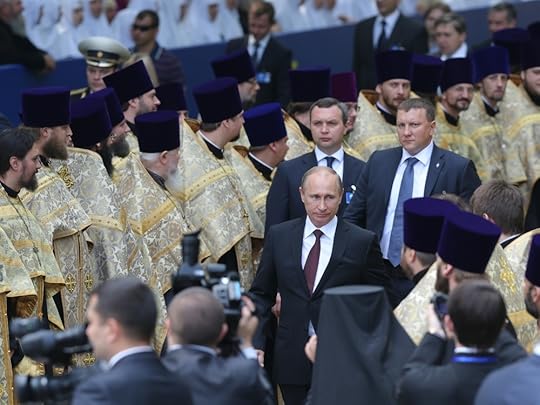 Europe and Central AsiaRussiaUkraineVladimir PutinCrimea
Europe and Central AsiaRussiaUkraineVladimir PutinCrimea
Alexander J. Motyl's Blog
- Alexander J. Motyl's profile
- 21 followers


